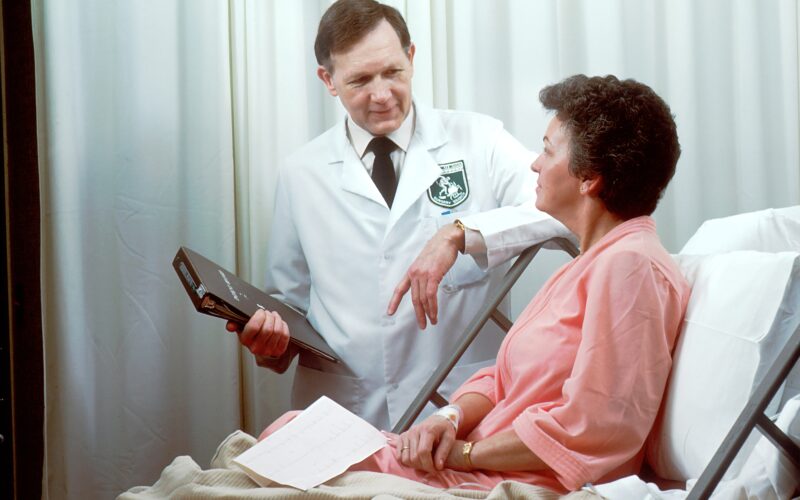Most patients who are in the last stage of Alzheimer’s disease or other illnesses have difficulty eating and drinking. Families must then ask themselves if the person needs a feeding tube for the elderly.
Families want to make the best decision for the ill person, but they are often misinformed about feeding tubes and may feel pressure from doctors and hospital staff because installing such a tube simplifies feeding.
WHAT ARE FEEDING TUBES?
A person who cannot eat or drink by mouth can receive liquid food through a tube that ends in the stomach. This is enteral tube feeding.
The tube can be inserted through the nose and down into the stomach (nasogastric tube) or be inserted directly into the stomach through a small incision in the stomach (percutaneous endoscopic gastromy, GEP).
ARE PROBES USEFUL?
Despite their convenience, feeding tubes sometimes do more harm than good. Here’s why:
The use of feeding probes is rarely useful for patients in advanced stages of Alzheimer’s disease.
People suffering from advanced-stage Alzheimer’s disease can no longer communicate or do simple actions. They have difficulty chewing and swallowing. This can cause serious problems, such as weight loss, weakness, and pressure ulcers (bed sores). Food can pass through the lungs and cause pneumonia. Therefore, these people often need help with food.
In many cases it is decided to use a feeding tube. This tube can be passed down the throat or inserted directly into the stomach through a small incision in the abdominal wall. The patient then receives a diet in liquid form through their tube.
It is important to know that tube feeding is no better than a carefully delivered manual food source; it may even be worse. It does not help people live longer, gain weight, regain strength, or regain their abilities, and it can increase the risk of pneumonia and pressure ulcers.
However, in some stages of old age, refusing food and water is a natural and painless step. There is no valid evidence that tube feeding helps these patients live longer.
The use of feeding tubes carries risks.
WHAT ARE THE RISKS?
Tube feeding involves many risks:
- It can cause bleeding, infection, skin irritation, or leakage around the tube.
- It can cause nausea, vomiting, and diarrhea.
- The tube can block or move; you must go to the hospital to have it replaced.
- The tube is very upsetting to patients suffering from Alzheimer’s disease; many try to remove it. Often, to prevent them, they are strapped down or given medication.
- Tube-fed patients are more likely to suffer from pressure ulcers.
- Tube-fed patients are more likely to regurgitate food, which carries a risk of pneumonia called “suction pneumonia”.
Later in life, fluids can invade the patient’s lungs and cause breathing problems.
UNDER WHAT CIRCUMSTANCES IS A FEEDING TUBE INDICATED?
The use of a feeding tube may be useful when the main cause of the nutritional problem has a good chance of being resolved. For example, the feeding tube can help people who have had a stroke, head injury, or surgery.
Feeding tubes are also useful for patients who have difficulty swallowing and who are not in the end stage of an incurable disease. For example, they can help people suffering from Parkinson’s disease or amyotrophic lateral sclerosis (Lou Gehrig’s disease).
KEY PRECAUTIONS BEFORE CONSIDERING A FEEDING TUBE
When caring for a person with advanced illness, certain measures can alleviate eating problems and other problems that arise late in life.
Treat illnesses responsible for loss of appetite, such as constipation, depression, or infection;
Manually feed the sick person before opting for a tube. Ask the doctor about the best foods to offer and the best way to give them manually;
Avoid taking unnecessary medications. Some medications can make eating problems worse, including:
- antipsychotics such as quetiapine (Seroquel and generic version)
- sleeping pills or anxiolytics, such as lorazepam or zopiclone;
- medicines that work on the bladder, such as oxybutynin (Ditropan and generic version);
- certain medicines for osteoporosis, such as alendronate (Fosamax and generic version)
- Alzheimer’s disease medications, such as donepezil (Aricept and generic version).
- Ill-fitting dentures, pain in the gums or teeth make eating difficult or better.
Thus, consider palliative care. Many people suffering from advanced disease qualify for palliative care if they have great difficulty drinking and eating to maintain their weight.










